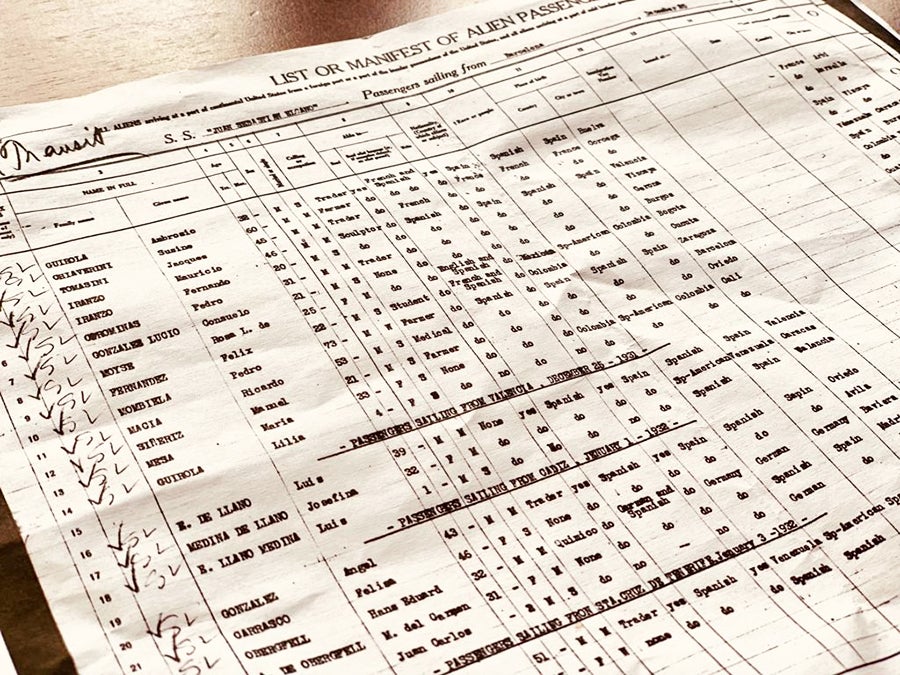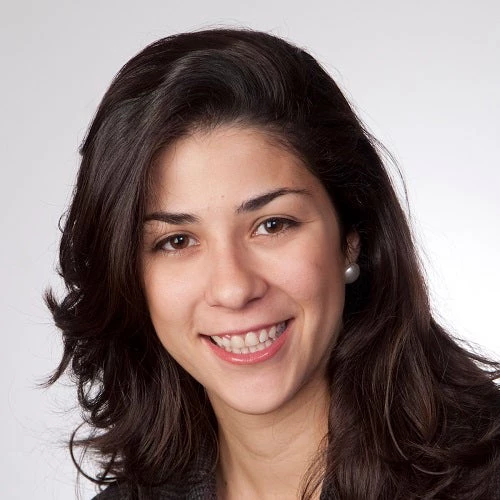In 1931, Maria Josefina Medina and Elias de Llano left Spain and embarked on their journey to then prosperous and promising Venezuela. Their 1-year-old baby, Luis Enrique de Llano Medina, my grandfather, celebrated his first birthday on the ship as was registered upon their arrival to the Port of New York on December 25, 1931, to then continue to their final destination. They were the first in their family to ever leave Spain in a genealogical tree that goes back to Spaniard settlers in the 700s. They were escaping social and economic insecurity and from a war-threatened Valencia.

My grandfather grew up in Venezuela. Recruited by Lebanese immigrants, he started working as a bank clerk in the coastal city of Puerto Cabello and proudly climbed the ladder to become the president of one of the top commercial banks in the country (owned and managed by the same Lebanese immigrants whose trust he had earned). In Puerto Cabello he met and married my grandmother, a schoolteacher and descendant of Syrian immigrants, and they raised four children (three boys and one girl, my mother).
Eighty years later, in 2011, I became one of the 6 million migrants who have fled Venezuela in search of a better life. A newlywed couple, my husband and I first landed in Chicago, a city we had only seen in pictures, and we later moved to Washington, where we’ve lived ever since.
Lesson #1: We have benefited from migration. We are lucky to have thrived in a country such as the United States and at an organization such as the World Bank, two experiences that have certainly given us tremendous opportunities to grow professionally. My husband has now started a small business and is learning about the challenges and opportunities of being a migrant entrepreneur.
Lesson #2: Our families have benefited from our migration through remittances and the exchange of ideas and technology. Thankfully, our economic gains have allowed us to send remittances to my parents back home and to our families who have migrated to Spain. Every month, we send money to help cover tuition fees for Maya, a relative who is close to our hearts and who goes to school in Barcelona. For the most part, the tuition includes the cost of her school meals and this ensures needed nutrition for her to learn and grow, all the more important because her parents find it difficult to pay all the bills.
Lesson #3: Remittances alone are not enough. We’ve learned the hard way that sending remittances is not enough to spur Maya’s healthy development as a child. She needs strong family support, services, networks, and opportunities to which she has limited access. At home, her father has been arrested repeatedly for intimate-partner domestic violence. Maya’s mother still depends on his legal migratory status in Spain, to be able to stay there herself. He has been released and they still live together. The impacts of this traumatic experience on Maya may be long-lasting and could have a direct impact on her ability to develop into a psychologically healthy adult, integrate into society and later contribute to the economy. No amount of remittance money will ever protect her from these impacts. Facilitating safe and legal migratory pathways for Maya’s mom can help her secure independence, pay taxes, access support services, and earn a dignified salary to support her child without revictimizing herself and her daughter to trauma.
My greatest honor: reframing migration as an opportunity for all
In the migration literature, the international and academic community, including the World Bank, has focused on studying and disseminating the economic benefits of migration. But somehow, the economic argument hasn’t been enough among policymakers and the general public. Spurious research and rising xenophobia have had more traction.
My take is that predominantly, migration is still described as a problem, and resistance to migration is often framed in social terms across the globe. This disconnect has rendered our standard economists’ toolkit insufficient to move the needle on a complex conversation.
Our most recent work at the World Bank has taken a broader lens. By focusing on the social and economic integration of migrants, we have been able to change the discourse and help our clients see migration as a development opportunity.
As we approach the end-of-year celebrations around the world, let us come together around what makes us human. I would like to quote A Christmas Carol's Ebenezer Scrooge on an important lesson for all: “I will honor Christmas in my heart and try to keep it all the year. I will live in the Past, the Present, and the Future. The Spirits of all Three shall strive within me.''
In 2022, my pledge to you is to celebrate migration as a development opportunity for all: migrants, their families of origin, and their host communities. I will celebrate my own migration journey at home and work as I will honor my family members who first left Spain and Venezuela (my Past), my husband and children making a new life as immigrants in the US (my Present), and how I can contribute to the global debate on migration and inclusion (my Future).
And in that same spirit I wish you a happy birthday, abuelo! And Happy Holidays to all!



Join the Conversation